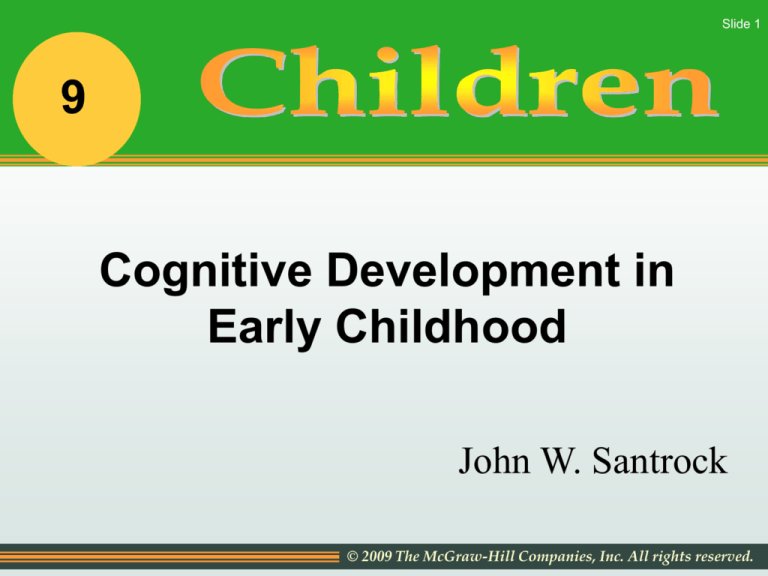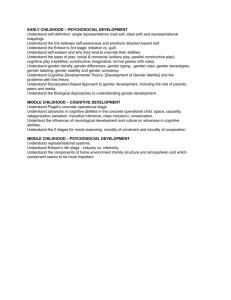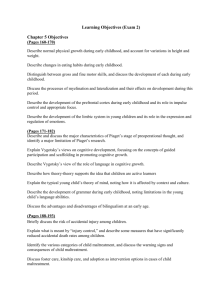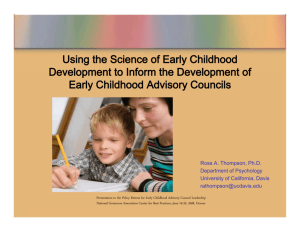
Slide 1
9
Cognitive Development in
Early Childhood
John W. Santrock
© 2009 The McGraw-Hill Companies, Inc. All rights reserved.
Slide 2
Cognitive Development in
Early Childhood
• What Are the Three Views of the
Cognitive Changes That Occur in Early
Childhood?
• How Do Young Children Develop
Language?
• What Are Some Important Features of
Early Childhood Education?
© 2009 The McGraw-Hill Companies, Inc. All rights reserved.
What Are the Three Views Of the Cognitive Changes That Occur in Early Childhood?
Slide 3
Piaget’s Preoperational
Stage
• Operations: internalized set of actions
• Preoperational stage
– Ages 2 to 7
– Stable concepts formed
– Mental reasoning, magical beliefs emerge
– Cannot reverse mental actions
– Contains 2 substages: symbolic function
and intuitive
© 2009 The McGraw-Hill Companies, Inc. All rights reserved.
What Are the Three Views Of the Cognitive Changes That Occur in Early Childhood?
Slide 4
Symbolic Function Stage
• First substage of preoperational thought
– Occurs about ages 2 to 4
– Child gains ability to mentally represent an
object not present
– Drawings are imaginative
– Thought still flawed, not well organized
© 2009 The McGraw-Hill Companies, Inc. All rights reserved.
What Are the Three Views Of the Cognitive Changes That Occur in Early Childhood?
Slide 5
Symbolic Function Stage
• Two limitations on preoperational thought
– Egocentrism: inability to distinguish
between one’s own perspective and
someone else’s
– Animism: belief that inanimate objects have
lifelike qualities and are capable of action
© 2009 The McGraw-Hill Companies, Inc. All rights reserved.
What Are the Three Views Of the Cognitive Changes That Occur in Early Childhood?
Slide 6
The Three Mountains Task
View 1
View 2
(d)
(c)
Child
seated
here
(d)
(b)
(a)
(a)
(c)
(b)
Child seated here
What Cognitive Changes Occur in Early Childhood?
Fig. 9.1
© 2009 The McGraw-Hill Companies, Inc. All rights reserved.
The Symbolic Drawings of Young Children
(a) 3½-year-old’s “a
pelican kissing a seal”
Slide 7
(b) 11-year-old’s drawing, which
is more realistic and less inventive
Fig. 9.2
© 2009 The McGraw-Hill Companies, Inc. All rights reserved.
What Are the Three Views Of the Cognitive Changes That Occur in Early Childhood?
Slide 8
Intuitive Thought Substage
• Children begin to use primitive reasoning,
seek answers to all sorts of questions
– Occurs about 4 to 7 years of age
– Limits of preoperational thought
• Centration: focusing attention on one
characteristic to the exclusion of all others
• Conservation: realizes altering object’s
substance does not change it quantitatively
© 2009 The McGraw-Hill Companies, Inc. All rights reserved.
What Are the Three Views Of the Cognitive Changes That Occur in Early Childhood?
Slide 9
Piaget’s Conservation Task
Fig. 9.3
A
B
(a)
C
A
B
C
(b)
© 2009 The McGraw-Hill Companies, Inc. All rights reserved.
Some Dimensions of Conservation:
Number, Matter, and Length
Type of
conservation
Initial
presentation
Manipulation
Preoperational
child’s answer
Number
Matter
Slide 10
Length
Two identical
balls of clay
shown to child
Two sticks are
aligned in
front of child
Child is asked
which row has
more objects
Experimenter
changes shape
of one ball
Experimenter
moves one
stick to right
“Yes, the longer
row”
“No, the longer
one has more”
“No, the one
on top is
longer”
Two identical
rows of objects
shown to child
Fig. 9.4
© 2009 The McGraw-Hill Companies, Inc. All rights reserved.
What Are the Three Views Of the Cognitive Changes That Occur in Early Childhood?
Slide 11
Vygotsky’s Theory of
Development
• Social constructionist approach
– Children actively construct their
knowledge and understanding
• Ways of thinking, understanding develop
primarily through social interaction
• Cognitive development depends on tools
provided by society
• Minds shaped by cultural context
© 2009 The McGraw-Hill Companies, Inc. All rights reserved.
What Are the Three Views Of the Cognitive Changes That Occur in Early Childhood?
Slide 12
The Zone of Proximal
Development (ZPD)
• Lower limit: what child can achieve
independently
• Upper limit: what can be achieved
with guidance and assistance of
adults or more skilled children
• Captures child’s cognitive skills in
process of maturing
© 2009 The McGraw-Hill Companies, Inc. All rights reserved.
What Are the Three Views Of the Cognitive Changes That Occur in Early Childhood?
Slide 13
Scaffolding and Dialogue
• Scaffolding: changing level of support
over course of teaching session to fit
child’s current performance level
– Dialogue
– Guided participation: stretch and support
children’s understanding of skills
© 2009 The McGraw-Hill Companies, Inc. All rights reserved.
What Are the Three Views Of the Cognitive Changes That Occur in Early Childhood?
Slide 14
Language and Thought
• Children use language to plan, guide,
and monitor their behavior
– All mental functions have social origins
– Private speech (self-talk): early transition
to be more socially communicative; used
more when tasks are difficult
© 2009 The McGraw-Hill Companies, Inc. All rights reserved.
What Are the Three Views Of the Cognitive Changes That Occur in Early Childhood?
Slide 15
Teaching Strategies
• Use child’s ZPD
• Use more-skilled peers as teachers
• Monitor and encourage private speech
• Effectively assess the child’s ZPD
• Place instruction in meaningful context
• Transform classroom
© 2009 The McGraw-Hill Companies, Inc. All rights reserved.
What Are the Three Views Of the Cognitive Changes That Occur in Early Childhood?
Slide 16
Evaluating and Comparing Piaget’s
and Vygotsky’s Theories
• Both theories are constructivist
– Vygotsky: emphasizes social opportunities
for learning that Piaget ignores
– Piaget: children construct knowledge by
transforming, organizing, and reorganizing
– Vygotsky overemphasized language;
guidance has pitfalls
– Both theories: teachers are facilitators
© 2009 The McGraw-Hill Companies, Inc. All rights reserved.
What Are the Three Views Of the Cognitive Changes That Occur in Early Childhood?
Slide 17
Information Processing
• Emphasizes how individuals:
– Manipulate information
– Monitor information
– Strategize about information
© 2009 The McGraw-Hill Companies, Inc. All rights reserved.
What Are the Three Views Of the Cognitive Changes That Occur in Early Childhood?
Slide 18
Attention
• Attention ability
– Greatly improves during preschool years
– Deficits of child’s control of attention
• Salient versus relevant
• Planfulness
– Child’s ability related to achievementrelated skills and social skills
© 2009 The McGraw-Hill Companies, Inc. All rights reserved.
The Planfulness of Attention
J
Slide 19
J
(a)
In 3 pairs of houses, all
windows were identical
(b)
In 3 pairs of houses, the
windows were different
By filming the reflection in children’s eyes, one could
determine what they looked at, how long they looked,
and the sequence of their eye movements.
Fig. 9.8
© 2009 The McGraw-Hill Companies, Inc. All rights reserved.
What Are the Three Views Of the Cognitive Changes That Occur in Early Childhood?
Slide 20
Memory
• Memory: retention of information
over time
– Implicit memory
– Explicit memory comes in many forms
• Short-term
• Long term
© 2009 The McGraw-Hill Companies, Inc. All rights reserved.
What Are the Three Views Of the Cognitive Changes That Occur in Early Childhood?
Slide 21
Memory
• Short-term memory
– Up to 30 seconds without rehearsal
– Span increases during early childhood
• 2 digits at ages 2 to 3
• 5 digits at age 7
– Individual differences at different ages
– Speed of repetition is powerful
predictor of memory span
© 2009 The McGraw-Hill Companies, Inc. All rights reserved.
Slide 22
Developmental Changes in Memory Span
8
Digit Span
7
In one study:
memory span
increased from 3
digits at age 2 to
5 digits at age 7
6
5
4
3
2
1
0
2
4
6
8
10 12
Adults
Age (years)
© 2009 The McGraw-Hill Companies, Inc. All rights reserved.
What Are the Three Views Of the Cognitive Changes That Occur in Early Childhood?
Slide 23
How Accurate Are Young
Children’s Long-Term Memories?
• Young children remember large
amount of information with appropriate
cues and prompts
– Age and individual differences linked to
susceptibility
– Children as eyewitnesses in court:
accuracy affected by number of factors
© 2009 The McGraw-Hill Companies, Inc. All rights reserved.
What Are the Three Views Of the Cognitive Changes That Occur in Early Childhood?
Slide 24
Strategies and Problem
Solving
• Strategies – deliberate mental activities
to improve processing information
– Toddlers can learn a strategy
– Early childhood: stimulus-driven changes
to goal-directed problem solving
– Some cognitive inflexibility in ages 3 to 4
due to lack of understanding
© 2009 The McGraw-Hill Companies, Inc. All rights reserved.
What Are the Three Views Of the Cognitive Changes That Occur in Early Childhood?
Slide 25
The Young Child’s
Theory of Mind
• Awareness of one’s own mental
processes and processes of others
– Children ages 2 to 3 begin to understand
perceptions, desires, and emotions
– Children ages 4 to 5 begin to understand
that the mind can represent objects and
events accurately or inaccurately
© 2009 The McGraw-Hill Companies, Inc. All rights reserved.
What Are the Three Views Of the Cognitive Changes That Occur in Early Childhood?
Slide 26
Theory of Mind And Autism
• Autism
– Can be detected before age 3
– Linked to genetics, brain abnormalities
– Individual differences vary greatly
• Autistic children have
– Social interaction, communication problems
– Difficulty developing theory of mind
© 2009 The McGraw-Hill Companies, Inc. All rights reserved.
How Do Young Children Develop Language?
Slide 27
Understanding Phonology
and Morphology
• Most preschoolers gradually become
sensitive to sounds of speech
• Children know morphological rules
• Children abstract rules and apply
them to novel situations
© 2009 The McGraw-Hill Companies, Inc. All rights reserved.
How Do Young Children Develop Language?
Slide 28
Understanding Syntax
• Preschoolers show growing mastery
of complex rules for how words
should be ordered
• Elementary school children become
skilled at using syntactical rules to
construct lengthy, complex sentences
© 2009 The McGraw-Hill Companies, Inc. All rights reserved.
What Are Some Important Features of Early Childhood Education?
Slide 29
Advances in Pragmatics
• 3-year-olds: have ability to talk about
things physically absent
• 4-year-olds: develop sensitivity to
needs of others in conversation
• 4- to 5-year-olds: learn to change
speech style to suit the situation
© 2009 The McGraw-Hill Companies, Inc. All rights reserved.
What Are Some Important Features of Early Childhood Education?
Slide 30
Varieties In Early
Childhood Education
• Child-centered kindergarten: focus on
whole child; concern for child’s physical,
cognitive, socioemotional development
– Considers needs, interests, learning styles
– Play is very important to total development
© 2009 The McGraw-Hill Companies, Inc. All rights reserved.
What Are Some Important Features of Early Childhood Education?
Slide 31
Varieties In Early
Childhood Education
• Montessori: cognitive skill emphasis
– Considerable freedom and spontaneity to
choose activities
– Encourages self-regulation
– Criticisms:
• Deemphasizes verbal interaction
• Restricts imaginative play
© 2009 The McGraw-Hill Companies, Inc. All rights reserved.
What Are Some Important Features of Early Childhood Education?
Slide 32
Developmentally
Appropriate Practice
• Focuses on typical child development
within age span and uniqueness of
each child
– Age appropriateness
– Individual appropriateness
• Worries of childhood educators
© 2009 The McGraw-Hill Companies, Inc. All rights reserved.
What Are Some Important Features of Early Childhood Education?
Slide 33
Literacy and Early
Childhood Education
• Reading and Writing
– Children should experience feelings of
success and pride in early reading and
writing exercises
– Early efforts should be encouraged
– Children need models to emulate
© 2009 The McGraw-Hill Companies, Inc. All rights reserved.
What Are Some Important Features of Early Childhood Education?
Slide 34
Literacy and Early
Childhood Education
• Math
– Early childhood educators need to
introduce mathematical concepts,
methods, and language
– Special concerns for children from
low-socioeconomic-status families
– Learning paths tend to be similar
© 2009 The McGraw-Hill Companies, Inc. All rights reserved.
What Are Some Important Features of Early Childhood Education?
Slide 35
Educating Young Children
Who Are Disadvantaged
• Project Head Start: designed to
provide children from low-income
families opportunity to acquire skills
and experiences important for school
success
– Not all programs are created equal
– Most evaluations show Head Start
provides quality education
© 2009 The McGraw-Hill Companies, Inc. All rights reserved.
What Are Some Important Features of Early Childhood Education?
Slide 36
Controversies in Early
Childhood Education
• Curriculum controversy
• Does preschool matter?
• Should there be universal preschool
education?
• School readiness
© 2009 The McGraw-Hill Companies, Inc. All rights reserved.
What Are Some Important Features of Early Childhood Education?
Slide 37
Controversies in Early
Childhood Education
• Caregiver activities to encourage
‘readiness’
– Encourage exploration, research, new skills
– Mentor basic skills; guide and limit behavior
– Celebrate developmental advances
– Protect from inappropriate disapproval,
teasing, punishment
© 2009 The McGraw-Hill Companies, Inc. All rights reserved.
What Are Some Important Features of Early Childhood Education?
Slide 38
Diversity in Children’s
Development
• Japan
– Some kindergartens attached to universities
that have elementary, secondary schools
– Culture: being a group member, not an
individual
• Teacher-centered education:
– China, Thailand, Jamaica, Kenya, Turkey
• Child-centered education:
– Mexico, U.S., Singapore, Korea, Hong Kong
© 2009 The McGraw-Hill Companies, Inc. All rights reserved.
Slide 39
9
The End
© 2009 The McGraw-Hill Companies, Inc. All rights reserved.








